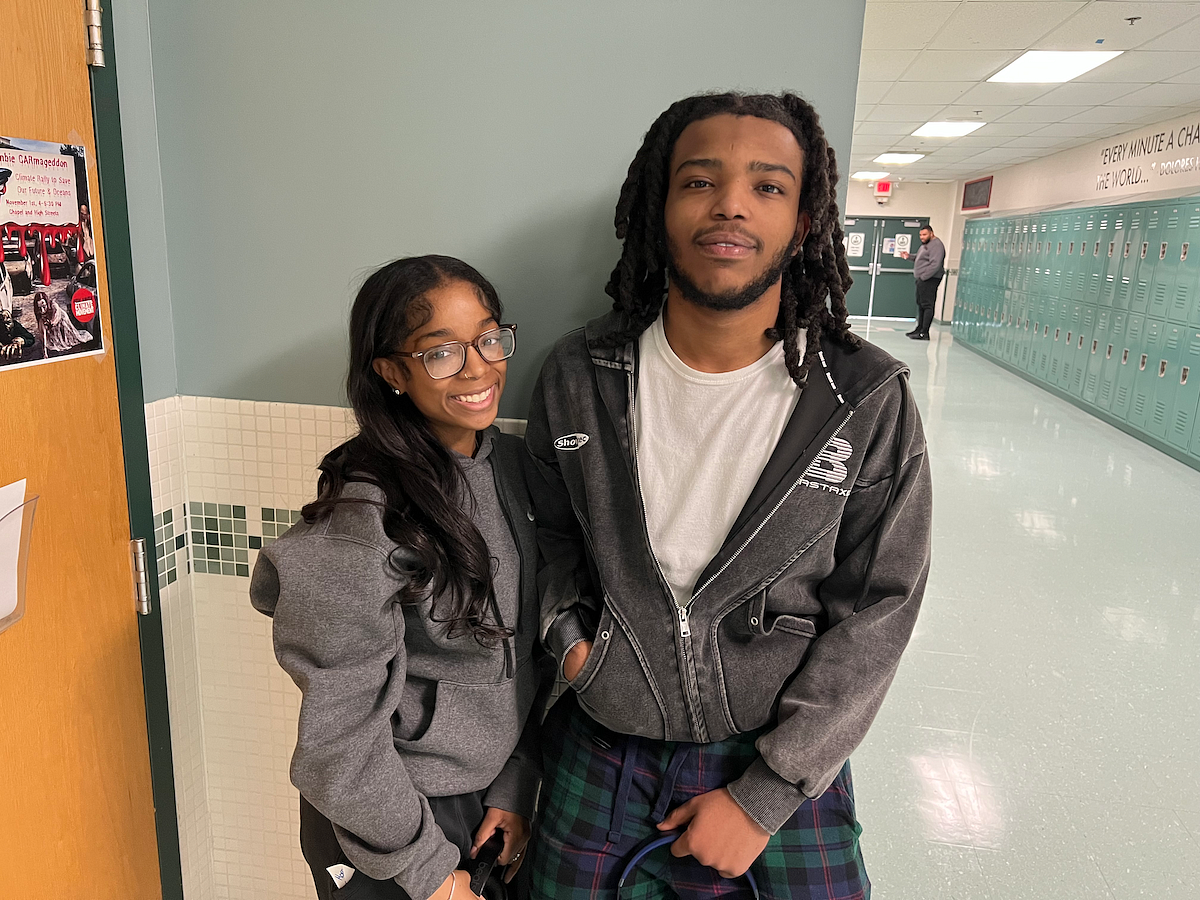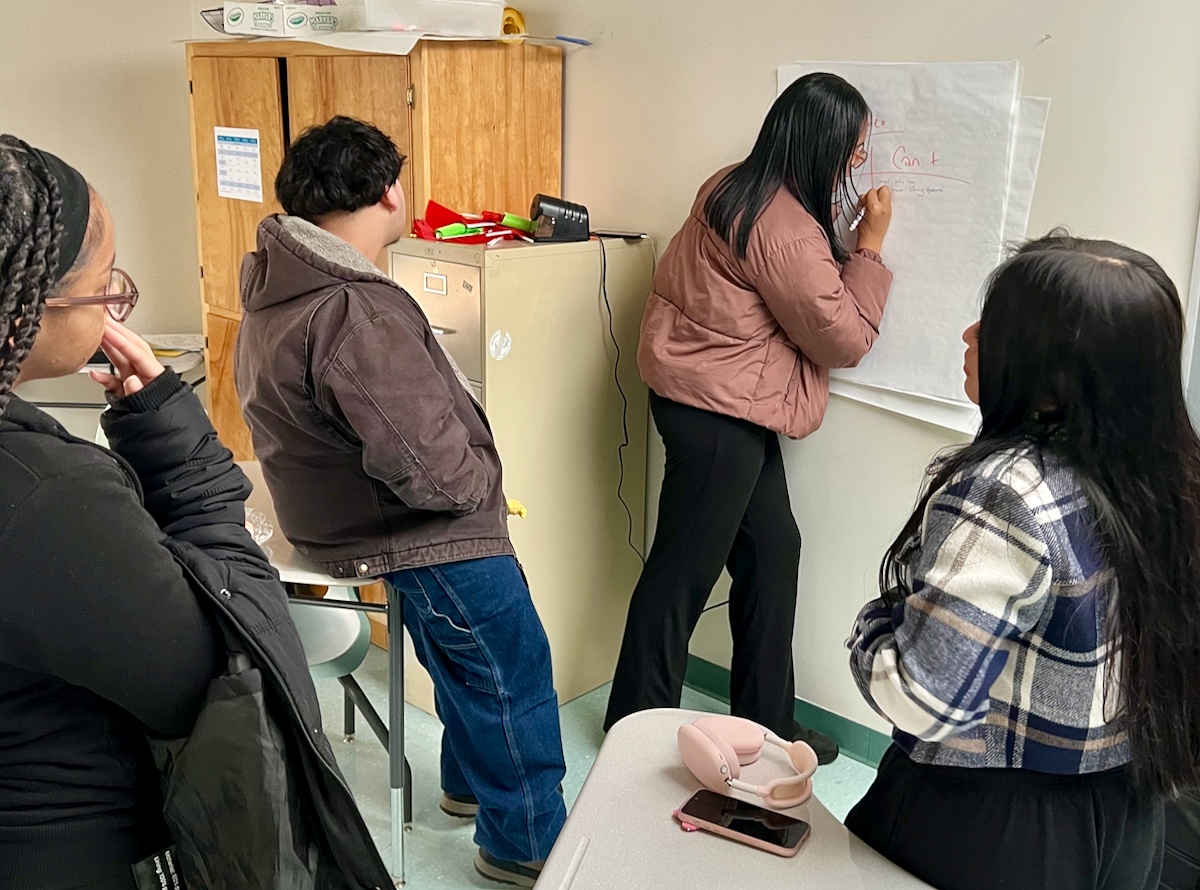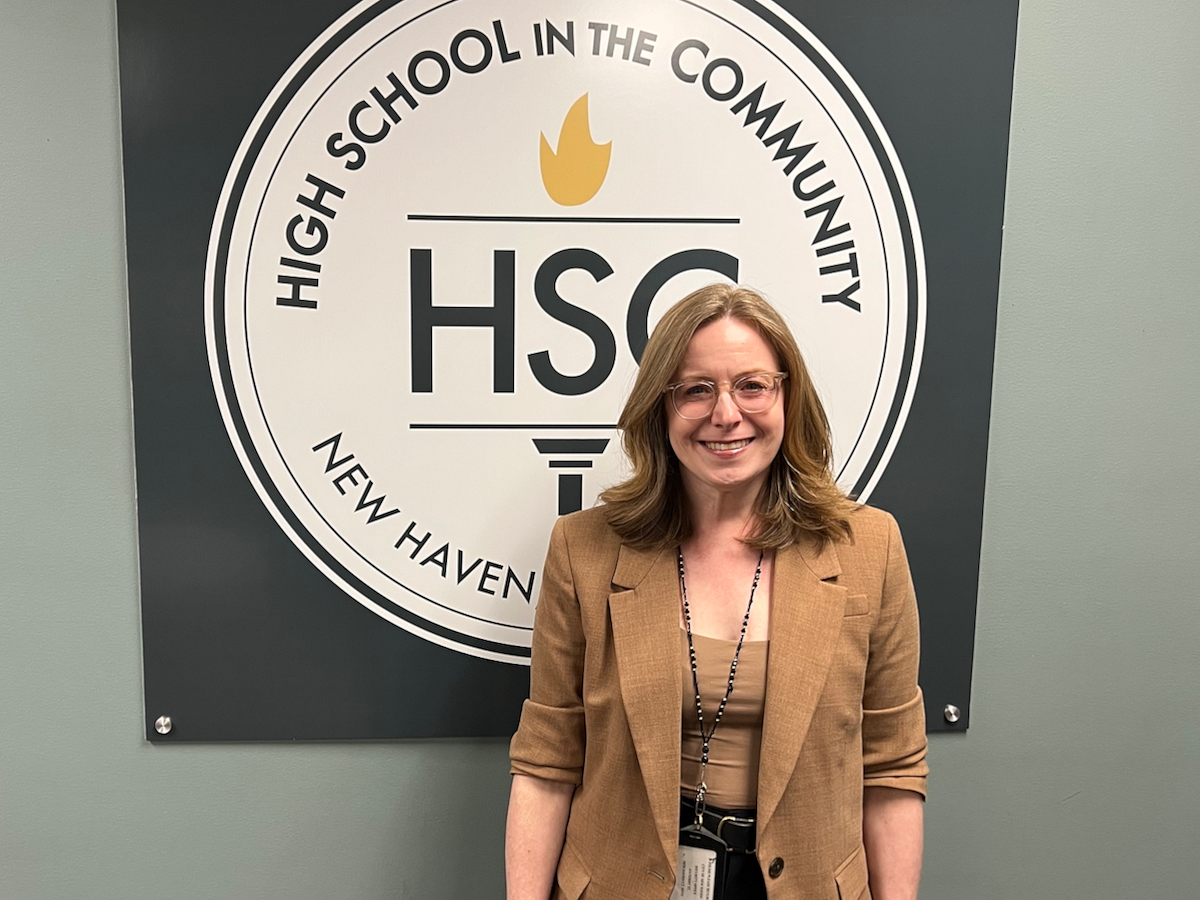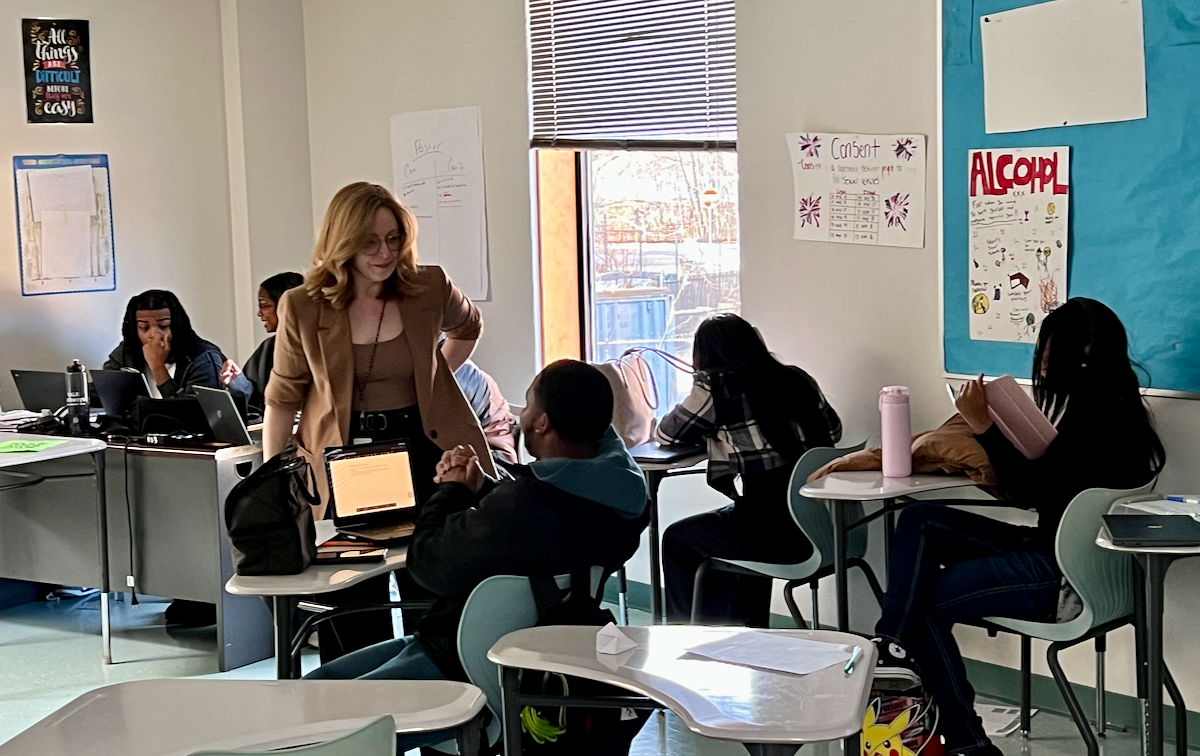Senior Projects Look Beyond Classroom

Strand and student Jyce Relaford, who wants to combat abusive relationships between teens.
Teen domestic violence, more mental health days, and the school-to-prison pipeline are just some of topics on the minds of High School in the Community (HSC) seniors — as they aim to spread awareness and make change through their final capstone projects.
Students at the small social justice-focused high school on Water Street spoke about those topics and projects Tuesday afternoon during their class taught by Cari Strand, the school’s “building leader,” or principal.
Some students, like Mekhi Duncan, expanded on their sophomore year social justice symposium projects for their senior capstone projects, allowing them to go more in depth with their interest.
Duncan shared Tuesday that due to some of his family and friends’ experiences with the prison system, he decided to focus both his sophomore and senior projects on spreading awareness of the systemic realities of the school-to-prison pipeline.
“I know how much it can change someone, and so if I can have an impact to keep people from falling into the trap of going outside and being in the streets, it will be self fulfilling,” he said.
So far, he said he’s sat down with the city’s mayor and other teens at the Edgewood skatepark to discuss the need for more opportunities for youth to spend their free time in positive spaces that keep them out of trouble and build up their skills.
This year, Strand, in addition to her administrative role leading HSC, is back in the classroom teaching the senior seminar capstone class made up of about 17 students.
Strand first introduced a pilot of HSC’s three-component senior capstone course — which includes a research paper, action project, and presentation — around 2010. Each year since then, the school’s senior students are tasked with an end-of-year project that cuts across curricula and showcases their learning on projects that affect the community and that they’re passionate about.
 Seniors Saumora Short and Mekhi Duncan.
Seniors Saumora Short and Mekhi Duncan. During Tuesday’s class, the group started with a community circle, then seniors learned from Strand about the different ways they can present their synthesized research. Students worked in small groups and then participated in a gallery walk of the pros and cons of each delivery method — like posters, videos, or slide decks.
While learning about each method Tuesday, senior Jyce Relaford decided that she will use a trifold board to present her project on spreading awareness about teen domestic violence.
Relaford is additionally working on a website to share with parents and peers about often-normalized behaviors that are unhealthy in teen relationships. This is the first time Relaford has created a website and she described it as a fun learning process. Just deciding on the site’s color scheme took her two weeks, she said.
“I want people to understand what it can look like because social media really makes it seem different. And teens are different from adults and sometimes that makes us think when it’s not actual hitting, it’s not domestic violence,” she said.
She plans to include information on her website about the mental impacts of these relationships, particularly on teenagers, whose brains are still developing and might later normalize unhealthy adult relationships.
She noted that normalized unhealthy behaviors in teen relationships can include things like cyber stalking, requiring a partner’s social media passwords, play fighting, or emotional abuse stemming from requiring partners give up their phones to search through.
“I just don’t want the relationships I see in the hallways and on social media to lead to more normalized domestic violence in our adult lives,” she concluded.
 HSC seniors learn about different presentation methods and make pros and cons lists.
HSC seniors learn about different presentation methods and make pros and cons lists. Students noted that having their building leader as their teacher throughout the week has helped humanize Strand. “Some principals are just in their office all the time but Cari isn’t,” Duncan said. “It connects the school more.”
Relaford added that Strand has helped her avoid procrastination because she “encourages and pushes me to do things earlier and explains why.” She also noted that Strand’s vast network of connections has helped her better connect with people outside of her school to discuss her project.
During Tuesday’s 80-minute class, the students completed a free write about where they are each headed after HSC and how presentation skills will help them. The students said they would use their acquired presentation skills for college group projects, job interviews, and advertising/marketing.
“This whole school is designed to get you here,” Strand told her students.
Strand spent the last half hour of the class checking in with students individually as they worked on their research essays and decided on their presentation type.
Senior Saumora Short said she is excited to leave her mark on HSC after she completes her senior capstone. For her project, Short is working to bring back Wellness Wednesdays, a mental health-focused program established during the Covid pandemic for students to spend a large part of their school day doing activities to build social and emotional skills.
Short said boosting mental health is important, and that she saw a huge different in herself and her peers when Wellness Wednesdays were a district-wide initiative.
She hopes to launch a quarterly Wellness Wednesday at HSC this year to demonstrate its benefits to the Board of Education to consider at other schools.
“When we get piled up with work or have life problems, we get depressed and anxious,” she said.
So far, Short has gathered information from her HSC peers to learn what types of programs would help them when they’re stressed. She’s also planning to form a group of seniors to speak with Celentano seventh and eighth graders about transitioning to high school and specifically how to manage their time.
 Building leader and teacher by day Cari Strand.
Building leader and teacher by day Cari Strand. Before spending some time catching up on her administrative duties, Strand emphasized after Tuesday’s class that the senior seminar capstone course is made to reinforce and polish the many skills students have developed throughout their high school journey at HSC.
She wrote a new unit for the course over the summer focused on grounding it in HSC’s social justice values. The school aims to help students discover their passions and purpose and work to build up the skills to pursue them, she said.
“The goal for HSC is they leave knowing what they want and having skills to get it,” Strand concluded.
Strand noted that when she steps into the classroom three days a week for the course, she is able to focus on just teaching, which she has spent the majority of her 25-year education career doing around schools in New Haven and beyond.
As the school’s leader, Strand said she is tasked daily with providing “clarity of HSC’s mission” to the school community. Now that she is back in the classroom, she too grades work, calls parents, and needs prep time like her fellow educators, showing them that “I’m in it with you.”
As a result of the Covid pandemic, Strand observed senior students up until last year struggling to make the same community connections for their senior capstones. This year, she said students worked toward large community-focused projects despite the difficulty of executing their ideas without many recent references.
So far it’s been refreshing to flex her teaching muscles, she said, and that flexing those muscles is what it means to be an instructional leader.



